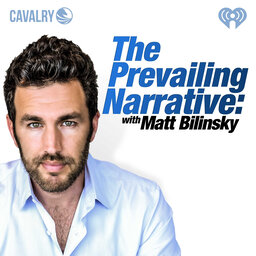Episode 21: Super Snake - Satirizing Elite Culture, Wealth, & Status via Memes
Super Snake (formerly, “Super Slutty Snake”) has been dubbed “High Society’s Memeologist” - providing biting social commentary and satirizing the rich and famous in an era where the money is flowing and fame is just one viral post away. Super Snake has given voice to many of the peculiarities of our era (“why does every newly minted tech billionaire need their own personal Shaman and a trip to Burning Man?”) and articulated the never-ending Battle for Status in the social media age.
In 1 playlist(s)
The Prevailing Narrative with Matt Bilinsky
A lively and fiercely analytical breakdown of news and current events, with interviews of thought le…Follow podcast
Recent clips

Episode 30: "Dark Plots & Secret Explanations": Study Rejects "Chemical Imbalance" as Cause of Depression (Max Lugavere Discusses); Biden & His Media Surrogates Re-Define "Recession; Kansas Abortion Ruling; Zelensky Poses for Vogue(?!); Public Health Lies on Monkeypox
1:38:34

Episode 29: Kamal Ravikant - Silicon Valley Thought-Leader, Investor, & Bestselling Author on Loving Yourself, Stepping Past Fear, Extreme Sharing, Investing Skills, and Living a Life of Honesty, Adventure and Authenticity
1:12:12

Episode 28: Political Scientist Wilfred Reilly on Gun Control, Targeted Solutions, and the Facts and Myths About Gun Violence in America; Nihilism and Mass Shootings
1:44:29
 The Prevailing Narrative with Matt Bilinsky
The Prevailing Narrative with Matt Bilinsky